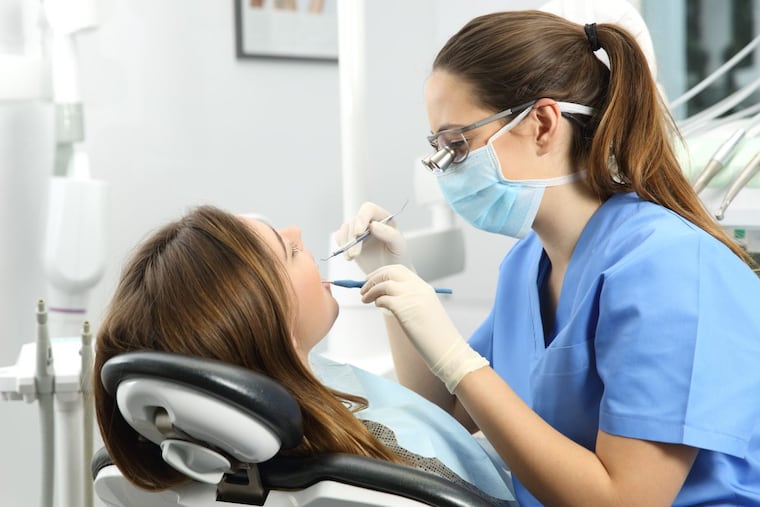Pennsylvania adjusts dental restrictions to allow emergency procedures
Pennsylvania walked back dental work restrictions to make it easier for people to get emergency care.

Pennsylvania adjusted its restrictions on dental work after dentists said that too-strict rules prevented them from performing even emergency procedures.
Now, patients experiencing an emergency, such as an abscess or infection, can call their dentist for a phone evaluation, and will be asked to come in for treatment if necessary.
Routine cleanings and non-emergency procedures are still banned in Pennsylvania and New Jersey under U.S. Centers for Disease Control and Prevention guidelines to limit the spread of the coronavirus.
Dentistry has a high risk of spreading the virus because saliva particles can become airborne and “aerosolized," meaning they become very fine and can hang in the air much longer than normal, making them easy to inhale. But dentists said certain emergency procedures, such as extracting an infected tooth or re-cementing a crown, can be done safely with proper protection, and would reduce the risk of patients in distress turning to already busy hospital emergency departments or self-medicating with painkillers.
The new rules, issued late Thursday, reverse a March 22 order from the Pennsylvania Health Department ordering dentists to stop performing even emergency dental procedures unless using personal protective equipment, including N95 respirators, and working in a negative-pressure room. Under the updated rule, dentists still need to wear a respirator mask, but do not need to work in a negative-pressure room — a resource the vast majority of private practices and school clinics do not have.
Even hospital-based dental clinics, including Einstein Medical Center’s, were unable to meet the state’s guidelines.
“The main hospital has negative pressure rooms, but our dental suites do not — so that’s been a challenge for us,” said Eric Sachinwalla, medical director of infection prevention and control at Einstein. “We did look into if we could do things outside the dental area, but the tools they need are all in the dental office."
Michael Barnes, a private practice dentist in South Philadelphia, said he is pleased the state reversed its emergency restriction because he worried about how patients experiencing dental pain would respond when unable to get treatment.
Without a negative-pressure room, Barnes was limited to seeing patients through virtual visits and prescribing antibiotics or pain medication. Tooth problems can escalate quickly from minor discomfort to major pain. Antibiotics can sometimes help relieve pain from a tooth infection temporarily, but often the only way to fix the problem is to remove the infection.
“We’re not ready to go back to full-on working — that’s not what anyone wants right now,” Barnes said. “But at the minimum it would help very much to be able to bring a patient in, look in their mouth, see what’s bothering them and if we can do anything to help them.”